Civil engineers have a real and tangible impact on our world; their work affects just about all aspects of everyday society. LMU's civil engineering program teaches students to develop the technical and people skills needed to design projects, conduct research and work in a wide variety of professional fields. As a diverse discipline of engineering, there are many different areas that a civil engineer can choose to specialize in. LMU students have the opportunity to choose one of the following sub-fields to concentrate on during their studies: water resources, environmental, structural and construction, geotechnical, sustainability and transportation.
Concentrations
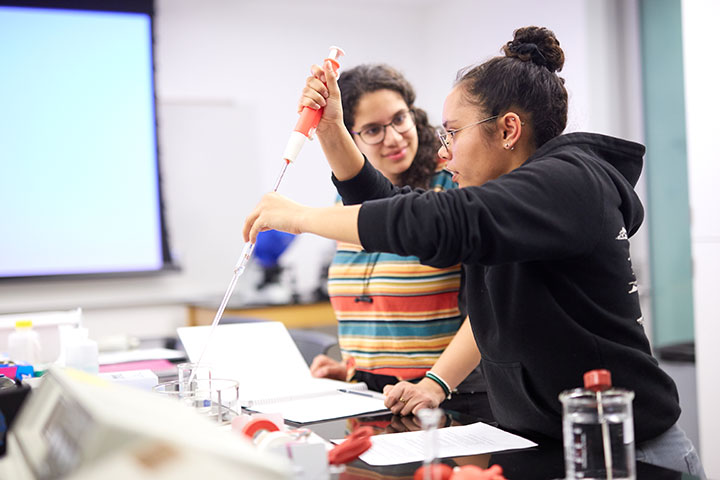
Water Resources
Civil engineers who specialize in water resources are fundamental to protecting the nation's water supply. They are responsible for engineering the processes related to water collection, storage and distribution, which ultimately impacts our overall national agriculture outcomes, as well as communities' access to water for residential and personal use.

Environmental
Civil engineers with specializing in environmental examine the quality and safety of our environment, including our water supply and air quality. Your ability to drink clean water without worry is partially due to the work of environmental civil engineers.
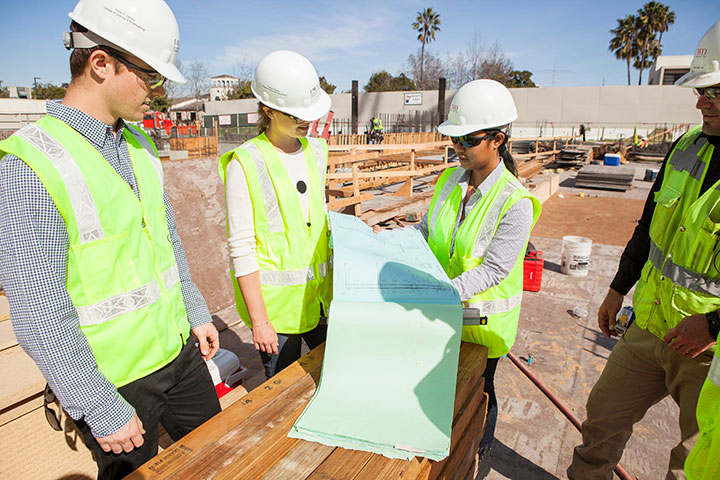
Structural and Construction
Structural and construction-focused civil engineers are responsible for building our infrastructure. They lead the construction of buildings, ranging from schools and offices to sports facilities and houses, as well as bridges, dams and other structures.

Geotechnical
Structural and construction-focused civil engineers are responsible for building our infrastructure. They lead the construction of buildings, ranging from schools and offices to sports facilities and houses, as well as bridges, dams and other structures.
Civil Engineering Courses
The following are the courses open to civil engineering majors. Course load includes electives, which give students the option to concentrate in one civil engineering specialty.
-
Civil Engineering (CIVL)
- CIVL 305 Structural Theory
- CIVL 320 Introduction to Environmental Engineering
- CIVL 360 Structural Dynamics and Seismic Systems
- CIVL 395 Engineering Economics and Decision Theory
- CIVL 400 Fundamentals of Water and Wastewater Treatment
- CIVL 410 Soil Mechanics
- CIVL 411 Design of Foundations and Earth Structures
- CIVL 490 Civil & Environ Engineering Seminar
- CIVL 498 Special Studies
- CIVL 499 Independent Studies
- CIVL 500 Fundamentals of Water and Wastewater Treatment
- CIVL 505 Aquatic Chemistry
- CIVL 508 Contaminant Fate, Transport & Remediation
- CIVL 513 Solid Wastes Engineering
- CIVL 515 Industrial Waste Management
- CIVL 517 Water Treatment Processes
- CIVL 518 Water Reuse and Desalination
- CIVL 519 Advanced Integrated Water Treatment Systems
- CIVL 526 Surface Water Hydrology
- CIVL 527 Urban Water Systems and Stormwater Management
- CIVL 528 Groundwater Hydrology and Sustainable Management
- CIVL 529 Groundwater Contaminant Transport and Remediation
- CIVL 530 Design of Concrete Structures
- CIVL 531 Principles of Water Quality Management
- CIVL 532 Structural Steel Design
- CIVL 533 Design of Wood Structures
- CIVL 536 Nonlinear Structural Analysis
- CIVL 537 Building Information Modeling
- CIVL 538 Construction Management and Sustainability
- CIVL 539 Design of Masonry Structures
- CIVL 546 Geotechnical Earthquake Engineering
- CIVL 547 Dams and Levees
- CIVL 549 Hazardous Waste Remediation
- CIVL 551 Remote Sensing with Civil Engineering and Environmental Science Applications
- CIVL 553 Modeling Environmental and Water Resources Systems
- CIVL 555 Computational Fluid Dynamics
- CIVL 557 Finite Element Methods
- CIVL 571 Air Quality, Control, and Management
- CIVL 572 Sustainable Waste Management
- CIVL 573 Economics of Water and the Environment
- CIVL 574 Sustainable Engineering
- CIVL 575 Renewable Energy Systems
- CIVL 576 Project Management
- CIVL 577 Transportation Engineering
- CIVL 578 Research in Civil Engineering & Environmental Science
- CIVL 591 FE/EIT Environmental Preparation
- CIVL 592 FE/EIT Other Disciplines (General) Preparation
- CIVL 598 Special Studies
- CIVL 599 Independent Studies
- CIVL 601 Sustainable Water Quality and Resources
- CIVL 605 Aquatic Chemistry
- CIVL 608 Contaminant Fate, Transport, and Remediation
- CIVL 613 Solid Wastes Engineering
- CIVL 614 Industrial Waste Management
- CIVL 617 Water Treatment Processes
- CIVL 618 Water Reuse and Desalination
- CIVL 619 Advanced Integrated Water Treatment Systems
- CIVL 625 Applied Fluid Mechanics
- CIVL 626 Surface Water Hydrology
- CIVL 627 Urban Water Systems and Stormwater Management
- CIVL 628 Groundwater Hydrology and Sustainable Management
- CIVL 629 Groundwater Contaminant Transport and Remediation
- CIVL 630 Design of Concrete Structures
- CIVL 632 Design of Steel Structures
- CIVL 633 Design of Wood Structures
- CIVL 636 Nonlinear Structural Analysis
- CIVL 637 Building Information Modeling
- CIVL 638 Construction Management and Sustainability
- CIVL 639 Design of Masonry Structures
- CIVL 646 Geotechnical Earthquake Engineering
- CIVL 647 Dams and Levees
- CIVL 649 Contaminated Site Remediation
- CIVL 651 Remote Sensing with Civil Engineering and Environmental Science Applications
- CIVL 653 Modeling Environmental and Water Resources Systems
- CIVL 655 Computational Fluid Dynamics
- CIVL 656 Water Resources Systems Modeling
- CIVL 657 Finite Element Methods
- CIVL 671 Air Quality, Control, and Management
- CIVL 672 Sustainable Waste Management
- CIVL 673 Economics of Water and the Environment
- CIVL 674 Sustainable Engineering
- CIVL 675 Renewable Energy Systems
- CIVL 676 Project Management
- CIVL 677 Transportation Engineering
- CIVL 678 Research in Civil Engineering & Environmental Science
- CIVL 690 Comprehensive Oral Exam
- CIVL 691 FE/EIT Environmental Preparation
- CIVL 692 FE/EIT Other Disciplines (General) Preparation
- CIVL 695 Master Thesis
- CIVL 696 Thesis Defense
- CIVL 698 Special Studies
- CIVL 699 Independent Studies
- CIVL 2200 Engineering Thermodynamics
- CIVL 2300 Mechanics of Materials
- CIVL 2500 Surveying and Mapping
- CIVL 3100 Fluid Mechanics
- CIVL 3150 Hydrology and Water Resources Engineering
- CIVL 3200 Introduction to Sustainability & Environmental Engineering
- CIVL 3350 Structural Analysis and Design
- CIVL 3360 Dynamics and Seismic Systems
- CIVL 3360 Structural Dynamics and Seismic Systems
- CIVL 3400 Analytical Methods in Civil and Environmental Engineering
- CIVL 3410 Introduction to Geotechnical Engineering
- CIVL 4001 Civil Engineering Design, Practice, and Ethics
- CIVL 4900 Fundamentals of Engineering Exam Review
Environmental Science (ENVS)
- ENVS 460 Environmental Microbiology
- ENVS 551 Remote Sensing with Civil Engineering and Environmental Science Applications
- ENVS 552 Spatial Data Analysis and Geographical Information Systems
- ENVS 583 Environmental Toxicology and Health Risk
- ENVS 605 Aquatic Chemistry
- ENVS 607 Environmental Engineering and Science Lab
- ENVS 608 Contaminant Fate, Transport, and Remediation
- ENVS 613 Solid Wastes Engineering
- ENVS 651 Remote Sensing with Civil Engineering and Environmental Science Applications
- ENVS 652 Spatial Data Analysis and Geographical Information Systems
- ENVS 681 Ecosystem Services in Urban Landscapes
- ENVS 682 Urban Coasts: Habitats, Stressors, and Resilience
- ENVS 683 Environmental Toxicology and Health Risk
- ENVS 684 Climate Change and Impacts
- ENVS 695 Master Thesis
- ENVS 696 Thesis Defense
- ENVS 698 Special Studies
- ENVS 699 Independent Studies
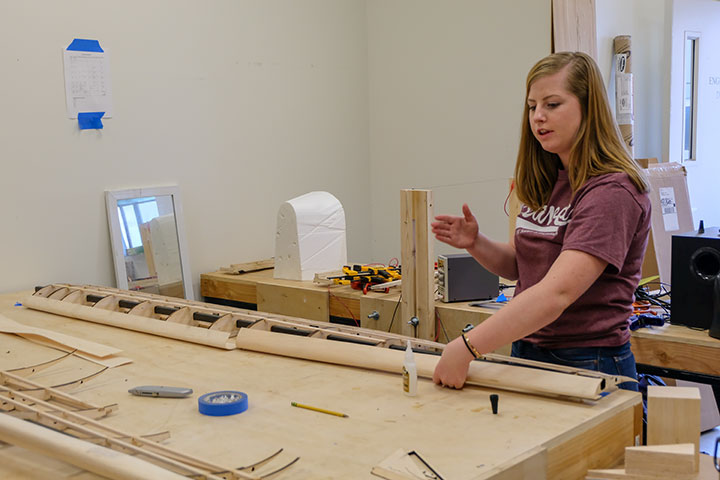
Explore Senior Design Projects
Explore senior design projects from recent civil engineering graduates.
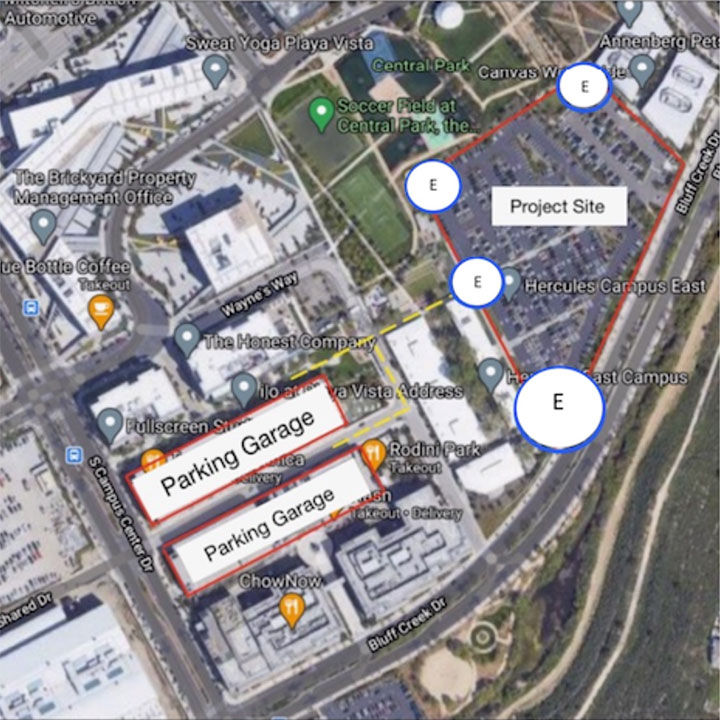
Kicking Around a New Idea
Serdion Mekbib, Maryela Mendoza and Jacob Victor DeLeon imagined what it might take to create a soccer stadium in Playa Vista.
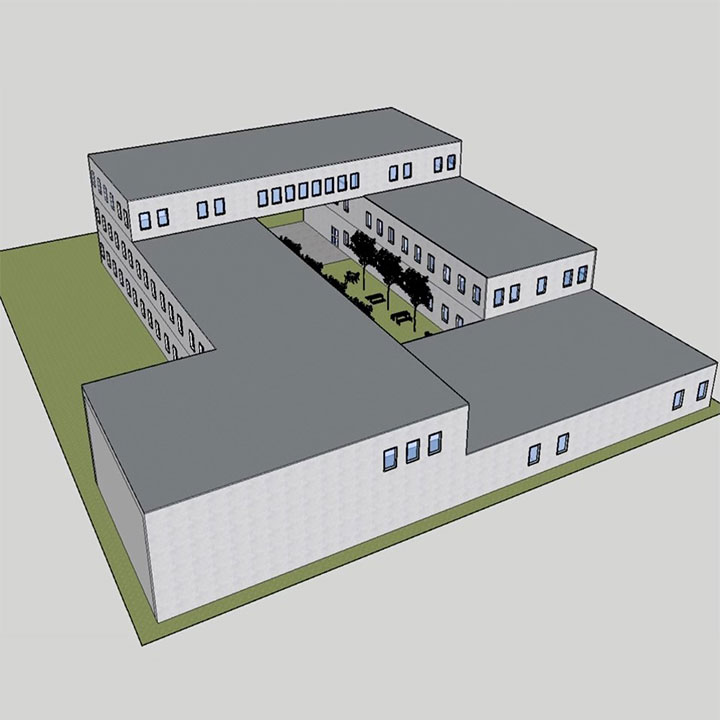
Build It and They Will Come
Wyatt Hiyane, Manuel Perez and Gabriela Torres designed a new building for LMU's Engineering Department.

Going With the Flow
Nimai Alicer, Morgan Anderson and Carlos Yvellez drafted plans for a new water supply dam and pipeline.
Check Out the Engineering Design Showcase for More Student Capstones and Research Projects.

